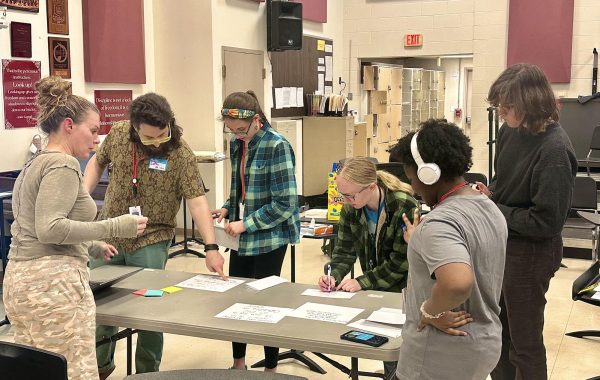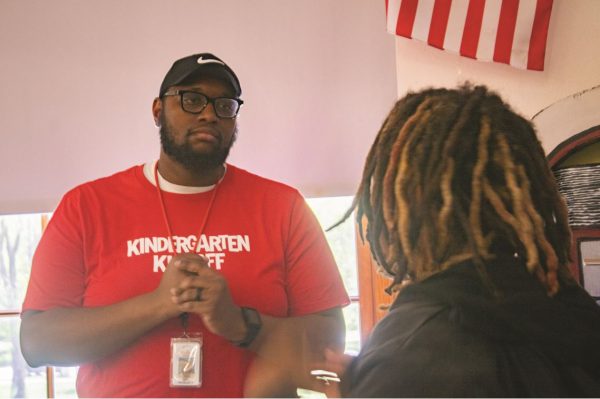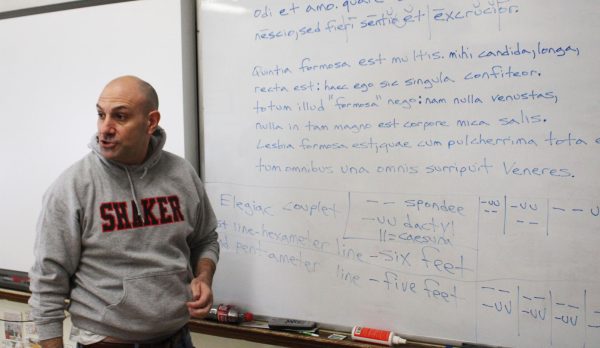High School Teachers Publish Open Letter Stating Concerns
SHTA high school members’ letter cites autonomy and communication; Hutchings responds with invitation to talk

The first paragraph of the open letter published by Shaker Heights Teachers’ Association high school members May 11.
“We, the High School Members of the Shaker Heights Teachers’ Association, would like to express our significant concerns about the present and future direction of our beloved building and school district.”
This is how the SHTA’s open letter to the school board, administration and community begins. Published May 11 via social media, the letter addresses the pressing concerns of SHTA members at the high school. According to the letter, these concerns have emerged in light of recent policy changes in both the building and district.
“This was an opportunity brought forward by a group of members at the high school to have that perspective and those voices heard in a more direct way that would reach the central administration, the board and the community through an open letter,” SHTA President Dr. John Morris said in a phone interview.
According to Morris, there are 136 high school teachers actively involved in SHTA and nine who are not association members. The high school membership decided that to publish the letter, 63 percent of members had to approve it first. However, Morris confirmed that “over 98 percent of those members sanctioned and supported this letter.”
The letter begins with a statement declaring the SHTA’s “purpose is not to tear down the district, but to build it up and make it stronger.” The letter then itemizes “problematic trends” in the district’s current direction, including what the association considers drastic changes that have been made and are under consideration at the high school.
The introduction also states that “many of [the teachers] are graduates of Shaker Schools, and many of [them] chose to move to this community, raise [their] children here, and send [their] children to Shaker Schools,” pointing out that these concerns are among faculty members who double as employees and residents of Shaker Heights.
According to Morris, who posted the letter to the SHTA Facebook page at 6:31 p.m. yesterday, the letter had reached 5,792 people by 3 p.m. today.
The letter is organized into five categories that identify the high school membership’s primary concerns: an increase in the micromanagement of teachers, a decrease in autonomy, rash changes in policy, a lack of teacher input and a lack of response to calls for change from administration.
“The high school represents some of the most dramatic changes because of the loss of our head principal, the implementation of new programs like MYP, the stress of testing, the SLOs and also the fact that we have such autonomous teachers,” Morris said. “We have such unique programs that the high school, possibly more so than other schools in the district, really experienced these changes all at once.”
The letter states that, “We understand that change is necessary and often difficult. We also know that we have traditions of excellence, innovation, autonomy, and community responsiveness that we cherish at the High School and throughout the district.”
The letter goes on to acknowledge Shaker’s longstanding reputation for graduating successful students who pursue unique and diverse programs at the high school. Yet, the teachers wrote, they recognize that there is room for improvement — but not at the expense of individual professional practice. “Our systems are not broken and in need of corporate-reform based repair,” the letter states. “We have never been a ‘one size fits all’ High School or school district. Why should we begin now?”
“The letter expresses that the pace of change, the type of change, the stakeholders in the changes that are being proposed, need to be very carefully selected,” Morris explained. “They need to be conscious of the history we have of autonomy in Shaker, and they need to be paced at a human level, as opposed to a corporate or a planned level.”
Since the 2013 hiring of Superintendent Gregory C. Hutchings, Jr., teachers and community members have characterized some of his decisions and those of the Board of Education as “corporate.” The approach, according to the letter, includes overly centralized hiring practices, excessive focus on SLO testing and MYP (while issues such as poor student attendance go unnoticed), and the destruction of collaboration in the teaching environment.
“There’s a growing disconnect between the central administration, teachers and the board,” high school social studies teacher Tony Cuda, a Faculty Senate member, said in a May 5 interview. “You can point fingers, but there is a drift. Fortunately, there have been attempts to step in the right direction,” he said.
Cuda believes meaningful dialogue between the administration and teachers that results in real and lasting policy change would be the first concrete step.
In an April 23 email interview, high school English teacher Jody Podl, another Faculty Senate member, agreed with Cuda’s view that improved communication between faculty and administration will help. However, Podl cited the current lack of communication as the source of the high school’s problems.
The SHTA letter echoes concerns that emerged from a teacher morale survey recently administered by the Faculty Senate. At a recent Faculty Senate meeting, survey results were shared with central administrators who accepted invitations to attend. “The central administration repeatedly affirmed that it not only supports but needs the high school to operate autonomously,” Podl said. “Thus, I think our different takes about what has been happening at the high school underscore the problems we’ve had communicating for the better part of this year as well as the ensuing concerns about trust.”
Podl, who noted a conflict between uniformity and individuality, cited the district’s ongoing effort to revise grading policies as an example of poor communication. The middle school grading policy was altered significantly this year and includes a provision unpopular with high school teachers that forbids assigning zeros for incomplete work, incorrect work or work not submitted. The high school, where teachers craft their own policies, is now the focus of the district’s grading policy efforts. However, “teachers still don’t know what’s going on with that,” Podl said.
In addition, Podl insisted that teachers in no way want to disregard administration; rather, teachers want to make sure everyone is on the same page.
“No one is saying that we just want to be left alone here to do our thing without input from anyone else,” Podl said. “What we are saying is that currently, we’ve got some issues that we need to work on, and we need systems in place that will actually help us get where we want and need to go.”
“Change happens organically, and when you have the investment of the stakeholders,” Morris explained. “We don’t believe we have full investment by all the stakeholders, especially the teachers, especially the department chairs, especially the formal leadership within the district. So this is an effort, it’s kind of our call to the board and central administration and the community that these issues need to be put in the forefront.”
Hutchings responded via email to a Shakerite request for comment May 12.
“The direction our community members, students, teachers, Board of Education, and administrators set forth in our five-year Strategic Plan encompasses much of what was laid out in the SHTA letter,” Hutchings stated. “Similar comments and suggestions have been expressed to me during the recent Faculty Senate meeting as well as my listening tour with faculty and staff members in all buildings.”
Additionally, in his statement, Hutchings invited SHTA members to attend a roundtable discussion with the Board of Education June 16. “I hope that SHTA officers and members will be inclined to accept this invitation as an opportunity to discuss the present and future of the Shaker Heights City Schools.”
Print Editor in Chief Ella Shlonsky contributed to reporting.






Tim Daunch | May 16, 2015 at 10:02 pm
Mr. Paul,
I’m not sure I fully understand your comment (due to typos and fragmented sentences), but it appears that you are asking about the possibility of racism at Shaker. If so, I offer the following:
We know that smoking on campus is against the rules. Let’s say, hypothetically, that 1 white student was caught smoking and 99 African American students were caught smoking. Statistically, that would be 99% of blacks are punished for smoking. If I follow your logic, this would indicate an overwhelming racial bias, to which I would reply “horse hockey”.
Schools have rules. Students who break those rules are punished. If those students happen to belong to differing demographic groups, how is that racist? What if there was one girl and 99 boys? Would that be sexist? Just as absurd.
Of course, if multiple white students were caught, but NOT punished, then we need to be asking some hard questions. But merely stating a disproportionality in numbers is most certainly not the basis for an automatic charge of racism. That is a very serious charge, which requires a responsible investigation. Similarly, the leveling of such a charge requires an equal, if not greater, responsibility. Rushing to judgement based on spurious statistics only serves to fan the flames of a serious problem in our society.